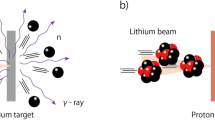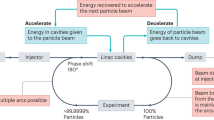Abstract
ARISING primarily from the fact that iron becomes saturated in the region of 10,000–20,000 gauss, high-energy ions and electrons have been obtained from cyclotrons and betatrons only by the use of magnetic fields of large orbital radii. The question has, therefore, often been raised as to the possibility of using iron-free fields of short duration, especially as fields of the highest magnitude have been obtained in this way. The following note describes an experimental resonance accelerator for electrons which uses such an air-cored field.
This is a preview of subscription content, access via your institution
Access options
Subscribe to this journal
Receive 51 print issues and online access
$199.00 per year
only $3.90 per issue
Buy this article
- Purchase on Springer Link
- Instant access to full article PDF
Prices may be subject to local taxes which are calculated during checkout
Similar content being viewed by others
References
Hill, R. D., Aust. J. Sci., 9, 87 (1946).
McMillan, E. M., Phys. Rev., 48, 143 (1945).
Author information
Authors and Affiliations
Rights and permissions
About this article
Cite this article
HILL, R. An Electron Accelerator with an Air-cored Field. Nature 159, 774–775 (1947). https://doi.org/10.1038/159774a0
Issue Date:
DOI: https://doi.org/10.1038/159774a0
This article is cited by
-
Electron synchrotrons with a solid guide-field electromagnet
Soviet Atomic Energy (1989)
Comments
By submitting a comment you agree to abide by our Terms and Community Guidelines. If you find something abusive or that does not comply with our terms or guidelines please flag it as inappropriate.



